When Alice Wu’s The Half of It debuted on Friday, expectations couldn’t have been higher. The filmmaker’s debut, Saving Face, is inarguably at the top of any lesbian film canon. Most importantly, it’s a movie that centers the lives and desires of Chinese women and immigrant communities in ways that few movies have captured in the fifteen years since its groundbreaking indie release.
Alice Wu’s imprint is indelible on queer Asian art and media. And since The Half of It — following the life of lesbian teen and first gen kid Ellie Chu as she navigates adolescence, first loves, and friendship, in a majority white small town — is already quickly becoming a classic in its own wistful and moody right, we wanted to bring together some of our writers and editors, along with some friends of the website, to talk about the film, the incomparable Ellie, and their hopes and dreams for the future of queer and trans Asian American stories on screen.
When did you first encounter Alice Wu’s work? Have you seen Saving Face? Before you pressed play on The Half of It, did you have any expectations (or trepidations)?
Himani, Autostraddle Contributor: I had never heard of Alice Wu before The Half of It started being promoted on Autostraddle. I watched the trailer after reading Malinda Lo’s article last week, and I honestly didn’t know what to expect.
L, Writer: My friend N., who was my first queer Chinese American friend, introduced me to Saving Face our freshman year of college. It was the first movie I’d ever seen about queer Chinese American people, and even though the characters’ lives were very different from mine, it made me feel seen in a way I hadn’t experienced with a movie or TV before. When I heard The Half of It was coming out, I was so excited. Then I saw the trailer and was less excited. I’d been expecting another rom-com like Saving Face but instead, it seemed kind of funny but also sad because it was about a queer Chinese American teenager who feels isolated because she’s surrounded by white people. Too real! I didn’t want to spend my free time reliving my young adult trauma. My partner had to talk me into watching the movie this weekend, and I’m glad they did. It’s so good! Even if it did make me cry a little.
Kamala Puligandla, Autostraddle Deputy Editor: I remember being really into Saving Face at the time when I saw it. It felt like there was a whole world of queer Asian women that was just out there, and even though I’m not Chinese, that there might be something similar for me! Like L, had a lot of eye-rolly feelings about there being a white boy in this one, but everyone was going wild about it, so I figured it must have been fairly harmless. I didn’t really think about how it was going to be first and foremost an Alice Wu production, and so I did wonder, as a Netflix movie, how much of a teen bent it was going to take versus a more seriously thoughtful take. I was delightfully surprised to find it was the latter.
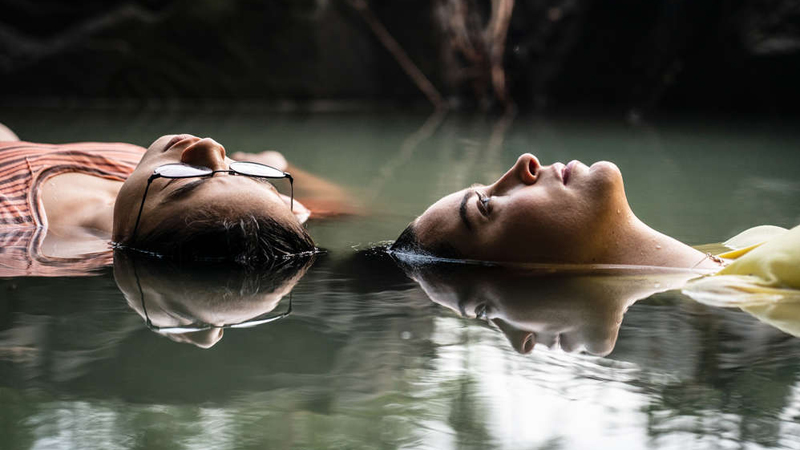
Leo Sheng, Actor (The L Word: Generation Q): I think I might have been in middle school when I saw Saving Face for the first time, just a few years after it was released. It was the first love story between two Asian women that I’d ever seen, if not the first queer Asian love story.
When I saw the trailer for The Half of It and that it was from Alice Wu, I got really excited. I was really hopeful for what it could mean in terms of young adult content and I really wanted to see how the story would unfold. I think a lot of people wanted or expected for it to end with Elli and Aster together, but I think on some level, I pressed play trusting that whatever ending it had, it would be the right one.
Xoài Pham, Autostraddle Trans Subject Editor:This was my first time encountering Alice Wu’s work! The trailer hooked me because I consistently long for queer and trans Asians in a high school context. One of my recurring daydreams is going back to high school and living as a trans girl who was entirely affirmed in her transition and her gender. While the protagonist is not trans, I had to see the film — as someone who one day wants to write for film and TV.
I expected a cute story about queer Asian resilience? But I got a messy, adorable tearjerker. I cried a record four times.
KaeLyn Rich, Autostraddle Writer: My Saving Face experience is as follows: Was I a college senior when I saw Saving Face? Yes. Did I think it was a good movie? It was ok! Do I generally love lesbian romance as a genre? Not really, sorry. Did I watch every lesbian romance movie available in college? Yes, of course. Can I still count on one hand the number of queer-directed Asian films I’ve seen? YES. Do I have Saving Face on DVD? Obviously, yes. I’m deeply appreciative of what Alison Wu brought sixteen years ago, which is like a whole generation ago in queer time. Saving Face was a story that needed to be told and I feel similarly about The Half of It. I’d say The Half of It resonated even more for me, because it felt like a place I know and a loneliness I felt growing up rural, Korean, and queer.
By the end of the movie, I really wanted more for Ellie… a whole bunch of QTPOC friends, partner, exes, and even people she doesn’t like that much! I really wanted to see her life in a few years — where she’s surrounded by friends and there’s not a single white person in the frame.
What did you think of our protagonist — and the hero of her own story — Ellie Chu (Leah Lewis)?
L: I related to Ellie Chu so much as someone who was also a nerdy Chinese American kid who still looks five years younger than all of their peers. But Ellie is much cooler than my teenage self — especially when she makes fun of Paul and the other white boy characters, who all look the same.
Leo: I also felt like Ellie was extremely relatable! She reminded me a lot of myself when I was in school (though I was a little more outgoing) and also of a few other young Asian folks I knew in high school and undergrad. I think her story was a little more complex than the general arc of a teenager finding themself, so I don’t want to diminish her story to simply that. I think she was finding more of herself and building on what she already knew and thought and felt, rather than starting out as some sort of unknown character or one whose journey is propelled by having to prove something to others.
L: By the end of the movie, I really wanted more for Ellie, not just one silly white boy friend but a whole bunch of QTPOC friends, partner, exes, and even people she doesn’t like that much! This wouldn’t have made sense in the actual movie, but I really wanted to see her life in a few years — where she’s surrounded by friends and there’s not a single white person in the frame.
Leo: Yeah, even if it’s not really on Ellie’s radar right now, I hope she finds some QTPOC to connect with.
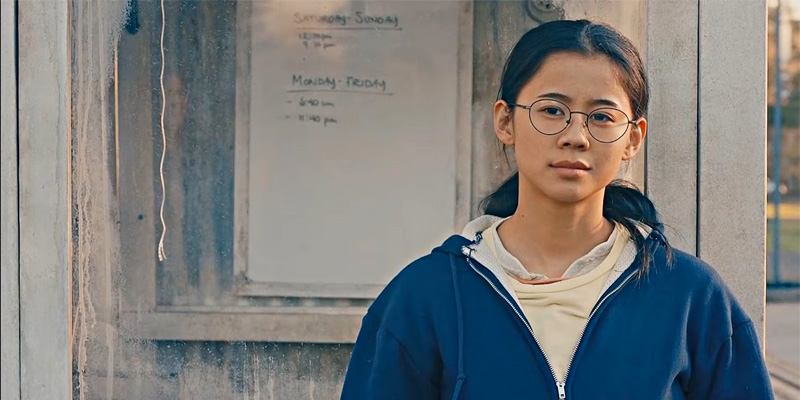
Kamala: I thought Ellie was so adorable, and I enjoyed her mix of sharp wit and compassion. I loved the scene in the music class where Aster suddenly registers to her — the slow, long shot — that felt so much like me and the way that my crushes and my future loves just HAPPEN to me. So that was fabulous.
As protagonists go, I found her strength and resolve, her “over it” frustration, and ultimately her own faith in herself, a really solid foundation for the movie. I was so ready to find her betraying herself, and she didn’t really. Instead, she allowed herself to be opened up and changed by her closeness to people. Did I wish she’d had a better community to share that with? Of course, but I did find it admirable that she could do that even with these people here in her small town.
KaeLyn: I related very hard to Ellie. I was the only Asian person in my class and, as a Korean transracial adoptee, I grew up with white people in every role in my life: teachers, friends, crushes, parents, classmates, random people wherever I went. I felt hypervisible because of my race and simultaneously invisible, also because of my race, and that liminal space was my normal.
Leah Lewis really captured that rural Asian-American experience. I love that Ellie’s story is not a typical coming out narrative or Very Traditional Family v. Very Queer Kid story that so often is at the center of POC LGBTQ narrative films. Ellie is already on the path of knowing herself when we first meet her and it makes sense to me that she chooses herself in the end. I think I would have related to that a lot if I’d watched this on Netflix as a high school-age teen, at a time in my life when finding romance seemed impossible, but getting the fuck out of my town was the ultimate goal.
Xoài: I don’t know if I’d be friends with Ellie! She reminded me of the East Asians in my high school who thought that Southeast Asians were beneath them. She fit the archetype of self-sacrificing top student who kept her head down. But the marker of Alice’s great writing is I still related to her longing, the feeling of needing everything to be in control. The girl who had to grow up too fast. I think many young girls from migrant families can relate to that. I wish I had seen something like this when I was a young person — I had no idea being a queer Asian person was even possible.
The Half of It takes place in the majority white fictional small town of Squahamish, Washington. Ellie’s coming of age is marked with the racist name calling and various microaggressions, but also The Half of It makes room for celebrating a variety of Asian cultural touchstones — from drinking Yakult to Ellie watching the 2014 Bollywood classic Ek Villain. Did it have any stand out points of resonance for you?
Himani: I feel like the movie masterfully showed the isolation of being “the only one” in a predominantly white space.
KaeLyn: I related the name-calling and microaggressions and parents who were very supportive, but also didn’t really know how to help me through.
L: Yeah, it was kind of hard to watch the scenes where Ellie is at school surrounded by white people. That first scene where Ellie is in the corner of her choir class distributing essays to her white classmates made me sad because it reminded me of all the times I’ve found myself in majority white spaces. I felt this way about the ending, too, when she’s on the train full of white people heading to a small liberal arts college where her dating pool will probably be a bunch of white queers who talk over her because they’ve taken a critical race theory class. That’s not a happy ending!
But as my partner pointed out, the whole movie is also making fun of white people customs. From Paul’s “taco sausage” to the white girls who present Aster with a pink scarf to match theirs to Trig’s rock performance, Alice Wu does a great job of pointing out the bizarre, exotic aspects of white “All-American” culture.
Leo: I’m a Chinese American adoptee who grew up a non-Asian household and a predominately Black school district. I definitely related to being one of the only Asian kids in my class, if not the only one at times, though thankfully I didn’t have the same experiences in school as Ellie.
I think something that resonated with me was Ellie’s wardrobe? It looked almost identical to mine from middle school and high school: the plaid, the Converse high tops, the tee-shirts over long-sleeves, the muted colors. Although for me it was more an expression of my gender identity, I felt like her clothes really added to a sense of standing out.
Kamala: I have to agree with Leo that something about the practicality in Ellie’s wardrobe really just felt so real to me!
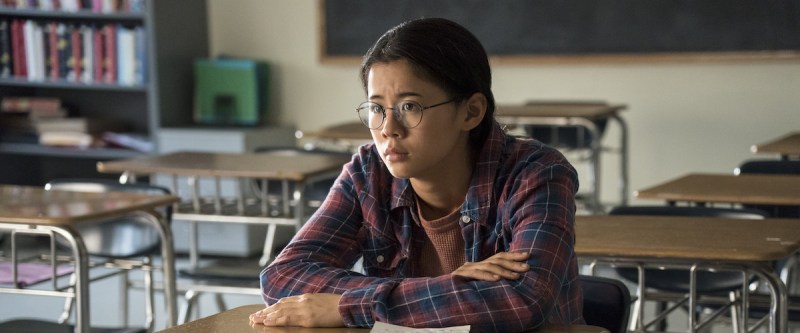
Himani: When it comes to Asian touchstones, though, I have to admit — I was a little underwhelmed? To be honest, I’m not familiar with Ek Villain although, admittedly, I don’t follow Bollywood avidly and thriller is usually not my genre of choice. However, given its use in The Half of It and that it was shown alongside Casablanca and Charlie Chaplin movies — it feels like an odd, albeit convenient, choice to me. If we’re talking about iconic Bollywood love scenes set to a departing train, I think Dilwale Duhania Le Jayenge is the more obvious choice. (Though it doesn’t neatly fit the parallel that Wu draws later in the movie for Ellie and Paul.)
I also think there was also an intentionality to some of the paucity of specifically Chinese cultural references, because assimilation creates further isolation, and disconnect with community makes it that much harder to hold onto culture. The focus on food felt relatable to me. I think food is one of the things our families do make a point of holding onto, even when other things get lost.
Kamala: Yeah, there weren’t many objects or items that were meant to say “this is Chinese,” but I imagine that this is also a certain version of reality for a lot of immigrants. More than Yakult, more than the Bollywood movie they watched together — what I saw being proposed as cultural touchstones were Ellie’s dad sitting in the chair watching the movies and not caring about his English improving, and Ellie taking it upon herself to start an essay-writing business that’s condoned by teachers, and the silent acquiescent acceptance of this white kid sitting on the living room floor during dinner, and the slow development of the dad starting to enjoy his company, and him talking to Paul, not Ellie, when he realizes that she’s sad.
Xoài: My favorite scene of the entire film was when Mr. Chu is speaking to Paul Munsky entirely in Mandarin. Other folks at this roundtable have pointed out the feeling of being the only Asian in a sea of whiteness. To that point, I felt there were parts were Ellie appealed to the approval of white peers. When she played her song at the talent show, she suddenly stopped being a victim to racist harassment. But the scene wherein Mr. Chu is speaking to Paul Munsky entirely in Mandarin displayed the most radical message to me: It does not matter if a white person understands, because my words hold inherent value.
KaeLyn: I loved that Mr. Chu spoke to Paul in Mandarin. It was both a reminder to Paul that there are things about Ellie he can never “see” as a white person and a show of vulnerability and trust from Mr. Chu, who I think really liked Paul and felt comfortable speaking Mandarin with him.
Leo: It really does show that there are just some things Paul can’t fully understand. Maybe the bar is pretty low, but I appreciated that Paul didn’t pout about it or make it about him.
Xoài: That “our words hold inherent value” is the lasting message I’d want every person of color to take away from this movie. In a country where people are harassed for speaking their native tongue, in a country where Indigenous languages are fading day by day, that scene delivered political resonance that expands beyond Asianness or queerness. Another layer of that scene that I loved was that Asian men are some of the first to assimilate within Asian communities; they’re tempted by the power of white masculinity. In this case, Mr. Chu did the exact opposite. I literally screamed at the television.
There’s so much that goes unsaid in Asian families, and you just learn how to read silence. The Half of It captures that perfectly.
Alice Wu highlighted one of the film’s final scenes between Ellie and her father as one of her favorites. In it, Ellie returns home to see him making dumplings and remarks there’s a lot of them. Her father nonchalantly responds that there’s a lot of meals at Grinnell to account for, acknowledging Ellie’s dream school. Of the scene, Wu reflected: “This is so Chinese. No one says ‘I love you.’ We all just do things, like cook or sacrifice for each other.”
How did you find Ellie’s relationship with her Dad?
Himani: I really appreciated the sensitivity with which the relationship between Ellie and her father was shown. Everything was so subtle but those subtleties said everything. There’s so much that goes unsaid in Asian families, and you just learn how to read silence. The Half of It captures that perfectly. For instance, there’s a scene early on where Ellie and her father share an awkward silence when Paul unexpectedly joins them for dinner; later, we have silence again when Ellie and her father try Paul’s taco sausage and you see them both surprisingly enjoying it; and a third time silence when Ellie’s father senses something is wrong but doesn’t know how to speak with Ellie about it. Each of those silences are so very clearly different, and we as the audience know it and feel it and see it. I also love the seamless interweaving of language because that is what happens in so many immigrant families.
Leo: Sometimes stories or scenes that really touch on what it’s like to grow up in Asian families make me a little wistful, because I can’t relate to that and I wish I could — it’s sort of an unintentional reminder that I’m even more of an outsider. In a way, I feel like I’m often watching what it’s like to be Asian (even though I know there are so many different experiences in Asian communities!!). That being said, I still gravitate towards those stories and I very much love getting to see and hear those experiences.
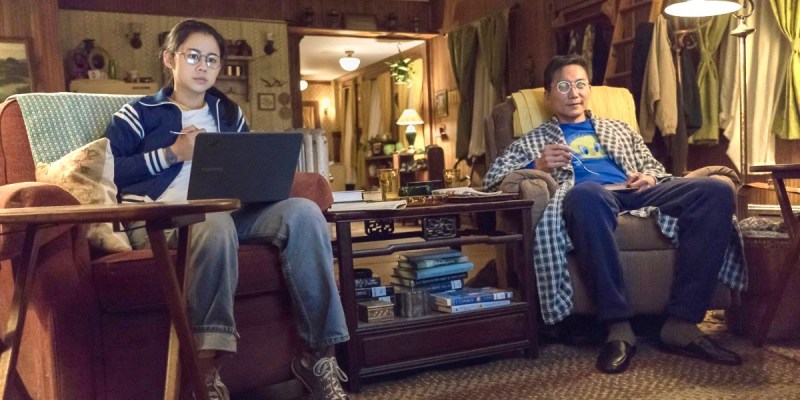
L: I relate a lot to what Leo said about feeling like an outsider when it comes to a lot of Asian American stories in movies and books. My parents are American-born chinese and only speak English. They’re also weird hippy artist people. As much as I love Alice Wu, I wish she wouldn’t say things like “that’s so Chinese.” It’s one way of being Chinese. There are many more.
KaeLyn: Oh, Leo, you said it! I love watching stories about Asian families and I also feel like a tourist or a guest when I try to relate. My experience is an Asian experience, even a typical one given how many Asian children have come to the U.S. through mostly transracial international adoption. I just know more about Italian comfort food and culture than about Korean culture. There was once a time when I was around Korean people all the time and the only thing I knew was Korea and I don’t remember any of it and I can’t get it back.
I felt joy watching that scene with Ellie and her dad, all the same, and how it was clear that he was telling her that he wanted her to be happy and that she didn’t need to feel guilt about living her life. I also loved the scene when he sprayed Trig with the kitchen hose and when he tried the taco sausage. At first, I thought the dad was going to be played as a melancholy spot in Ellie’s life, but that really wasn’t the case. He was a safe place, a home base, and he didn’t stand in the way of her happiness.
Alice Wu shared in her Director’s Note that The Half of It was inspired in part by her own intimate relationship and subsequent heartbreak with her straight best friend — “A straight white guy from the heartland, no less… But sometimes you meet someone and for whatever reasons, your ‘weird’ works together.” The relationship between Ellie and Paul Munsky (Daniel Diemer) is pivotal, did you think that their “weird worked together”?
Kamala: I think the “weird worked” in the way that most people looking for connection will find it wherever they are, even if they happen to be in Squahamish, WA. I don’t think there was anything particularly special about Paul and Ellie, except that they both shared an interest in the same girl, at the same time, who they liked for really different reasons. I liked their dedication to each other, it made me think that they were both really lonely and looking to be cared for, and it was nice that they had each other. I’m beyond the point in my life where I’m looking to extend myself and my interest to white men at all, but I remember being younger and entertaining them because yeah, we did like the same girls and we did listen to the same music. It was easy to hang out and smoke weed, and before I knew what intimacy looked like and how much I loved it, that ease seemed desirable.
L: Paul reminds me of a lot of white friends I’ve had in the past. In some ways we were very close and I trusted them deeply, but there were also parts of me I knew they wouldn’t understand. In one of the scenes where Paul is chasing after Ellie on her bike, my partner said something that really captures my feelings: “When talking to a white boy, you should always be riding ahead of him on a bike.”
Leo: Like L, I’ve also had white friends (and partners) that I was close to and trusted, but felt like the part of me they couldn’t understand was just too big.
I think Paul leaned on Ellie a lot, and I understand why given that she was helping him in such a heavy way. I appreciated the moments where he tried to get to know her, like when they were playing ping pong. But then when he misread everything and tried to kiss her, and then said what he said, I was very quickly and comfortably done with him. The ending was sort of sweet, but I also think she forgave him quicker than I might have.
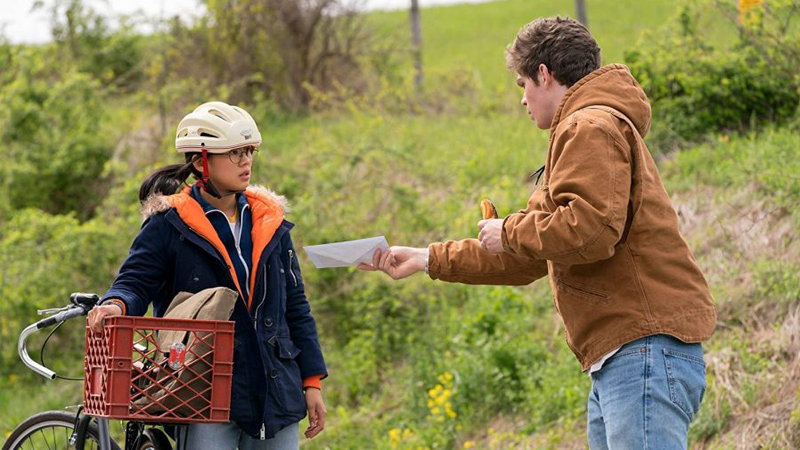
KaeLyn: It was hard for me because it started out so specifically transactional and with a fucked up power dynamic. Like, when she wouldn’t stop on her bike and he literally tipped her over trying to get her attention? I hated that.
Himani: … I actually really liked Paul and Ellie’s friendship? I didn’t come out until I was older and for so much of my life, I had no queer women / trans friends. I have also watched probably more hetero rom-coms than I would like to admit, so I appreciated what Alice Wu was doing with their relationship, in terms of taking a fairly classic rom-com formula (nerdy girl helps jock dude get attractive girl but actually jock dude falls in love with nerdy girl) and turning it on its head. It asks us to think about all the different kinds of love we can hold in our lives.
Xoài: I loved Ellie and Paul’s relationship because it blurred the line between romance and friendship. I think intimacy is fluid and shapeless. And that’s what makes it beautiful. The way we box intimacy into specific scripts — like partner, best friend, acquaintance, and so on — flattens the space we have to explore the intricacies of a human being relating to another human being. I think if we got a little weirder, we’d have better relationships with ourselves and other people. And we’d have a lot more fun.
Asian experiences and individuals are so vast and multifaceted. And no one in any of these stories is more or less valid as an Asian person. Each step we take to more inclusive representation is going to involve critiques and community dialogue.
Let’s talk about the broader pop culture landscape that The Half of It has arrived in! Thinking about Asian American and Asian diasporic representations in film and television, especially for queer and trans Asians, are there trends you’d like to see more of? Is there anything that you think works well right now? And what’s missing from the conversation?
Himani: When I think about the broader landscape of Asian and Asian American representation, in general, I think of movies like Crazy Rich Asians and Always Be My Maybe, and what I find so frustrating about representation like that is its fixation on and idolization of wealth. It feels so unrelatable to me, personally, and I think it taps into problematic stereotypes about Asians and money; meanwhile, Asians are “the most economically divided group in the US” per a 2018 study by the Pew Research Center. One of the things I LOVED about The Half of It, in contrast, is it centers an Asian family that is just trying to pay the bills, like everyone else.
When it comes to representing queer and trans Asians, one thing I think The Half of It does really well is show that even under a stoic exterior, Asian teens are struggling with the messiness of feelings and attraction and love just like every other teen everywhere. So often, I feel like we get reduced to the nerds who focus only on school and grades and are socially awkward. I love how the movie turns this on its head with Ellie using her brains to make a little extra money and, eventually, engage with her feelings for Aster.
Leo: I think about this so much as a queer and trans Asian actor, the choices I make about what auditions to go on and which to pass up. I’ve been feeling pretty hopeful about queer and trans Asian stories lately, though I think I’m biased because of my position. I want to see more queer and trans stories with Asian folks dating across the diaspora; more body diversity; more blended backgrounds.
One of the biggest things (and super complicated with lots of layers!) I’ve been thinking about the last few weeks is what it means to have lead love interests who are Asian. We hear the words “Asian American” or “Asian experiences” and it’s assumed to mean only East Asian. But Asia is a massive continent with almost 50 countries! South Asian communities are too often ignored or villainized in mainstream (white) media, and aren’t often treated much better in East Asian stories. Our stories and experiences are so vast and span so many ages, religions, careers, blended heritages, sexualities and genders.
I think we’re seeing a steady shift from hyper-sexualization, fetishization, and desexualization of Asian characters; the first two being done of Asian women, the last of Asian men. Part of that shift is more love stories with Asian leads, which send the message that Asian folks can be seen as desirable and sexy; like Crazy Rich Asians. Still within this new wave of love stories, another challenge that I’ve noticed is being implicitly told who deserves to be loved or seen as desirable or sexy based on certain characteristics and features — specifically skin tones — which I think is often a consequence of the colorism that exists in Asian communities. I think it gets even more complicated when major release projects (theatrical or streaming) have Asian love interests who are white passing or have more classically western features, because those stories and experiences are valid and they don’t make the person any less Asian! But, it sort of then implies Asian people are only seen as desirable or sexy if they fit that category. I want to stress though, that this is a systematic issue — Hollywood and mainstream media — not just on the shoulders of the actors who take these jobs.
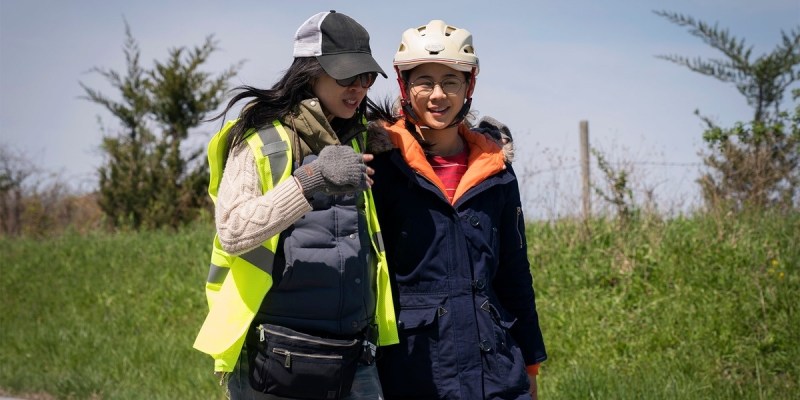
Kamala: I don’t feel like I have an informed picture of what the representational landscape of queer and trans Asian people and Asian American people in media looks like. I read more than I watch, and those issues are similar, but also different. I love what Leo has said about the need for a richer variety of representation. I also like his optimism, and find myself amused at the possibility of more stories about people who share shreds of my identity. I still think it’s absurd that “Asian” is a category — to me The Half of It is one version of Chinese American film, which should be held and compared and considered within a lineage of other Chinese American film.
Leo: Asian experiences and individuals are so vast and multifaceted! And no one in any of these stories is more or less valid as an Asian person. Each step we take to more inclusive representation is going to involve critiques and community dialogue. I hope that more stories hit wide-release theaters and streaming sites so that eventually, we have so many stories that we don’t have to worry about the implications of only certain narratives being uplifted. We won’t have to feel like we have to pick or prioritize communities and experiences. Movies and shows won’t have to carry the awful burden of the hopes and fears of Asian audiences because we want so much to be seen.
Xoài: I desperately need trans Asian women in film and TV being regular-degular. So much of the cultural perceptions of trans Asians was produced by colonizers and tourists who thought us to be exotic fetishes. So many Asian countries had lineages of gender variance before people even spoke the word “trans.” I can’t wait for the day that there’s an iconic trans Asian character that young trans people look to and say, “I knew I’d be okay because of her.” My hope is that queer cis writers fulfill their responsibility to their community by lifting up trans talent and bringing them into the rooms they never get to be in.
Ellie and Aster: Yay or Nay!? Did you get caught up in the romance? Were you rooting for Ellie to get the girl? Are you satisfied with the paths that the characters found for themselves?
Himani: I wish Aster had been fleshed out a little bit more in general. The only impression I’m left with is that Aster hasn’t figured out who she is or what she wants, whereas Ellie has. I think there was a part of me that wanted to see Aster more clearly reciprocate Ellie’s feelings, even though they clearly couldn’t be together. The movie does a fantastic job of showing us the path Ellie and Paul find for themselves, but Aster’s story is entirely unconvincing to me. Her father is conservative and gunning for her to marry Trig, but after she publicly accepts and then walks out on Trig’s proposal of marriage… somehow she’s applying to art school now? How did Aster and her family ever get there?
L said this earlier, but what leaves me feeling a little melancholy is knowing that Ellie will continue to be surrounded by whiteness at her liberal arts college in Iowa. I wish the movie had found a different place for her to go — a place where she can explore her queerness while also getting greater exposure to a variety of different people.
L: I agree with Himani. I don’t think Aster was fleshed out very well. For me, the romance was one of the least interesting parts of the movie. It was important to drive the plot forward, but I feel like the movie was more about being isolated in a very white small town and the two POC there, Aster and Ellie, trying to find their way out of it.
Leo: I agree, too. I think there were moments where we got a peek into Aster’s life, but mostly through the letters. I don’t think it was supposed to be about Ellie and Aster, and more about Ellie’s internal understanding and discovery.
I’m pretty content with them not being together. I think that their correspondence and Ellie’s feelings were more representative of the life Ellie wanted to lead. I think Aster was someone Ellie felt like she could talk to and who understood her in a way no one else in Squahamish could or would, and I think she definitely had feelings for Aster. But, I also think Ellie wanted to know more about the world than she wanted to be with Aster.
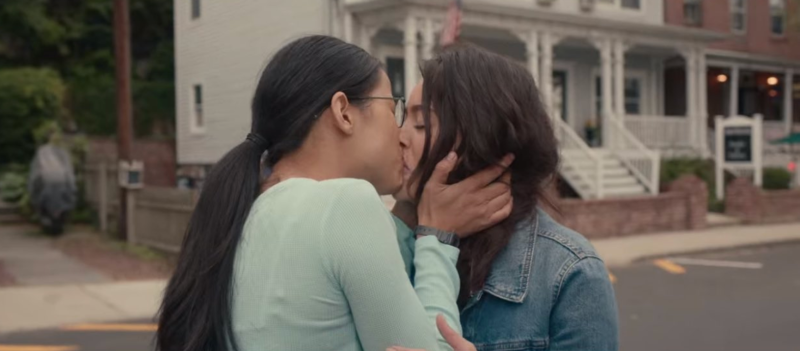
Kamala: It’s high school, so I get the allure of Aster: She’s pretty, she reads books, she seems not to have bought into the BS she participates in with her weird, ugly boyfriend — and she’s responsive to these gestures of romance that are being thrust in her direction. I loved the hot spring scene, because I feel like I’ve had SO MANY moments in my life where that is the fruition of the romance, and it’s no less satisfying that this was the biggest moment this relationship could unlock.
Like everyone said, is Aster ENOUGH for Ellie in the long run? Nah, but she’s a high school crush, she’s there to teach you about what you want. I was way more interested in Aster as a vehicle for Ellie to explore her desire and what love meant to her, and I thought it was a nice gesture for Aster to recognize that of course she could have seen through it all. As someone who did go to a small liberal arts college in the Midwest, I will say that there are still other people of color to date, though I’m not saying Ellie won’t get inundated by whites — it did take me a couple years before I convinced my half-Chinese college girlfriend to date me — but I have hope for her yet.
Xoài: All I’ll say is that the scene where they both wore long underwear in the hot springs made my entire life. That was better than the kiss for me.
KaeLyn: I’m glad they didn’t end up together, but you also need to remember I don’t love rom-coms. I’d say a big piece of why the genre isn’t for me is that in a lot of queer romances we LOVE TO TRAUMA BOND and true love is, well, boring. I mean, it’s a right of passage. And there was a time when we just needed more movies where the lesbians in love didn’t die. But I wanted more for Ellie in this the year 2020 and I’m so pleased with where Alice Wu left her and Aster.
I thought the chemistry was great from the start when Aster helped Ellie pick up her books and, like, casually flirted with her. I liked that we weren’t being queer-baited. Aster clearly had feelings for Ellie, too, even if she wasn’t sure what that all meant yet by the end. I loved that it ended with Ellie leaving from the station she worked for all her teen years to get to experience her own adulthood. Related/unrelated: I do wish Ellie had maybe tried consent when she kissed Aster, given how many questions she asked Paul about why he’d just go in for a kiss without asking, but you know, Aster didn’t seem mad.
I’d never change the storyline of a film to appease the insecurities of cis people or white people.
In talking about her 15 year hiatus between movies (we missed you!), and looking back on her mindset while exploring financial backing for The Half of It, Alice Wu told Autostraddle: “Eventually I will either find somebody who does [get it] or I won’t and that’s also okay. But what I don’t want to do is make compromises.”
Taking her words as inspiration to close out our time together, what would be the one thing you’d never compromise on in making your dream queer story come to screen?
Leo: I’m not gonna lie, I’m tired of the majority of widely released and highly talked about queer stories being about cis white queer folks. It’s kind of exhausting to hear certain movies or shows being heralded as, like, “peak queerness” when it’s only cis white queers. I think they’re important in the sense that they prove (to an extent) that audiences want queer stories. But also, a lot of queer POC stories are too quickly dismissed or critized in a white white ones aren’t. So, one thing I’d never compromise on is a story with queer and trans POC as the leads.
Kamala: I have to hard second Leo! In a lot of the fiction I’ve been writing recently, that’s one of the most important parts of the story. Because it changes the landscape, it inherently introduces different norms, it allows the characters to not have to contend with whiteness — and at this point, with room for very notable exceptions, the possibilities for stories involving white people feel overdone and limited. Another thing I want to see is not this quiet, bittersweet ending, but a complete and total gluttonous victory, like I was to see trans and queer POC just reveling in the kind of love or the kind of joy they spend an entire movie seeking, even if what that invovles turns out to be different than what they originaly set out to find.
Himani: I agree with what both Leo and Kamala. I want a queer Asian story, and I want a queer Asian story that is capable of imagining the kind of love-filled happy ending that all the Bollywood movies and all the rom-coms I have watched show me for heterosexual couples. But there’s an even more specific queer Asian story that I want to be told: I appreciate and value stories like The Half of It where a young Asian teen has the space to come into their queerness, and what Alice Wu said in her interviews about too many stories rooted in homophobia and violence really resonated with me. At the same time, I want to see a story that really delves into the cultural disconnect that leaves queer Asians, like myself, hiding from our own queerness well into adulthood.
Xoài: I would echo a lot of what other folks have said. I’d also never let a cis actor play a trans role. I’d never let a white actor play a role written for a person of color. But on a conceptual level, I would never change the storyline of a film to appease the insecurities of cis people or white people. The stories and characters that I want to see — and the ones I’ll write — will represent the future that I’m already seeing among my trans peers. We are actually building families, homes, and systems of care with little to no institutional support. And that wisdom must be unadulterated.
KaeLyn: I don’t think I’d write a very fun queer story. My favorite films are messy and weird. However, I’ve seen a ton of queer and trans films and when it comes to the rom-com genre, I want the BIPOC lesbian version of every Drew Barrymore/Adam Sandler movie. I want huge Hollywood budgets, less trauma bonding, no terminal illness diagnosis, no lesbian-feelings-but-I’m-married-to-a-man plots, less breathy yearning and more generalized horniness and just like, good acting and funny stories and big outrageous gestures and stupid happy endings with upbeat music. If I have to accept that falling in love with someone you just met a second ago is the answer, I want it to be FUN with HIJINX and PRIMO production value.
If I can be so bold, I just generally want cis white men out of the producer’s chair and out of the writer’s room. I want them to use their power and influence to open doors traditionally shut to BIPOC queer and trans writers and directors and producers and then get out of the way completely other than cheerleading and sending checks. The stories we have to tell are ones that white folks can’t even dream of and they will be so much richer, smarter, and funnier.



This was such a great conversation…thank y’all so much for participating.
Queer asian here who also went to a small midwestern college, and just wanted to say I loved the movie and I love everything about this conversation!! Thank you for this!!!
Loving the Alice Wu content. Thank you all for sharing your thoughts.
This was a wonderful read! Thank you all!
So happy to read this (and to also have not one, but TWO transracial adoptees on the panel)! A lot of stuff y’all talked about really resonated with me. I’m excited to watch your future dream projects become a reality.
Ya’ll are so smart! Proud to join ya’ for this one.
This is fantastic! Thanks y’all!
Wonderful read and enjoyed watching the movie yesterday